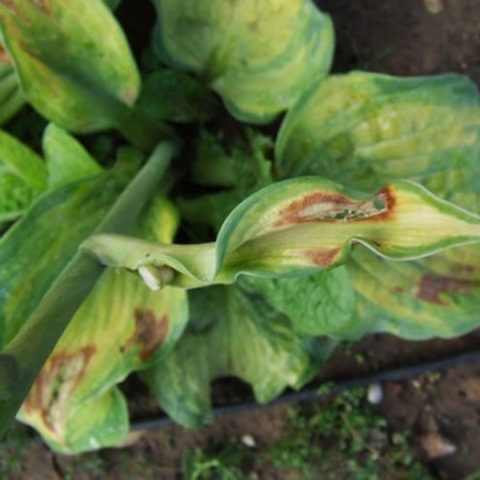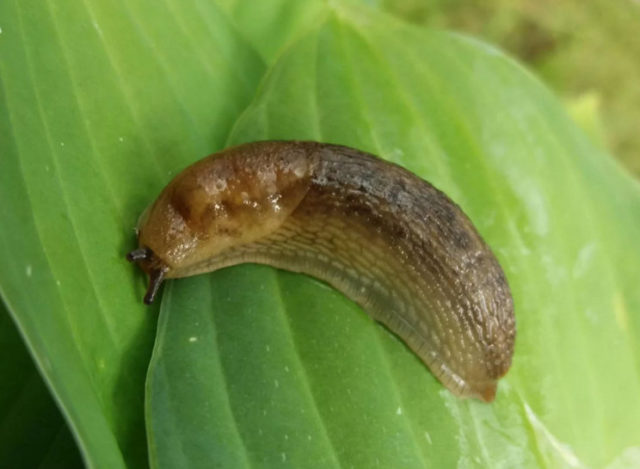Content
Hosta Patriot is a perennial herbaceous crop that is valued for its high decorative qualities. At the same time, the plant retains an attractive appearance throughout the season. This hybrid form is distinguished by a contrasting shade of leaves, therefore, it stands out noticeably against the background of other species. But in order to achieve maximum decorativeness, it is necessary to follow some rules of agricultural technology.
Description of hosts Patriot
This hosta is characterized by a domed, spreading bush (curtain). The plant has basal, petiolate leaves that fall down and form a rosette 70 cm high and up to 100 cm in diameter. Wide oval-heart-shaped plates with a corrugated surface. The leaves are 13 cm long and about 9 cm wide.
The Patriot hybrid host belongs to the variegated category. The main color of its leaves is dark green, but along the edges of the plates there is a wide white border. The root system of the plant consists of thickened branched and fibrous-cord-like processes.
The flowering period begins in mid-July or early August. At this time, the plant forms strong peduncles up to 1 m high, which confidently rise above the leaves. Flowers at "Patriot" are fragrant, funnel-shaped, large, with a diameter of about 6 cm. Often they grow one-sided, collected in racemose inflorescences. The shade of the petals is delicate lavender.
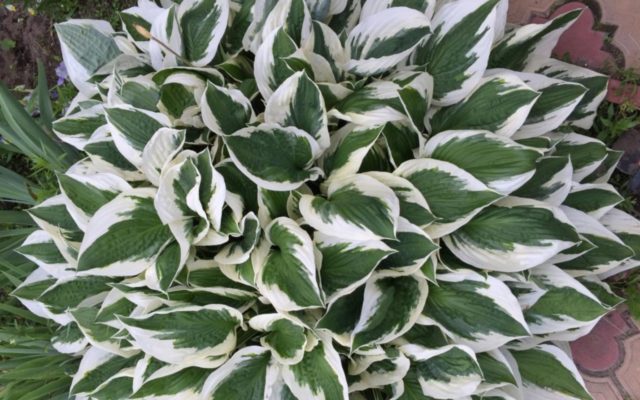
"Patriot" is recommended to grow in partial shade
This hosta is characterized by great vigor of growth. A spreading bush forms after three years.
This species has a high level of frost resistance. The plant does not suffer from low temperatures down to -34 degrees. Therefore, it is suitable for cultivation in the central and northern regions of the country.
Application in landscape design
Hosta "Patriot" looks great in a single, group planting, as well as when creating large compositions. Its tall bush can act as a tapeworm against the background of a green lawn and in combination with conifers. It can also be planted along the edge of water bodies, garden paths, near fountains and statues.
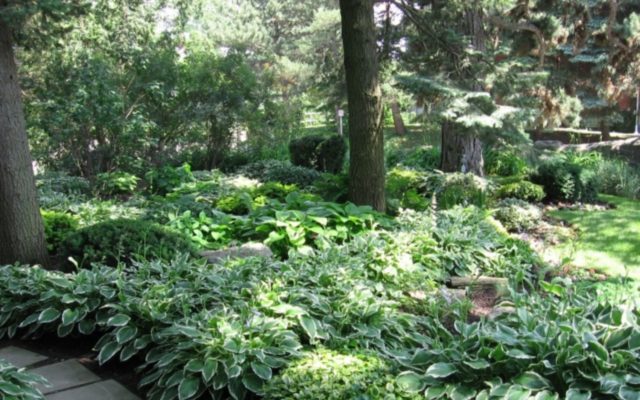
Hosta is designed to decorate personal plots
When combined with other types of culture, it is necessary to select varieties with the same bush height and flowering period. When creating a multi-level flower bed, the Patriot can be an excellent background for low-growing varieties of blue and green colors.
To emphasize the beauty of the leaves of this perennial, it is necessary to select companions with other shades for it. In this case, Heuchera, a mountain woman, is perfect.
If it is necessary to create a vertical accent, then the Patriot host is recommended to grow with tall phlox, daylilies and foxglove. Its beauty will be emphasized by a combination with plants with both small leaves - budra, lysimachia, periwinkle, and carved - ferns, anemones, astilbe, peonies. This perennial also looks great in composition with cereals: miscanthus, reed grass, molin.
In combination with roses in one of the host's flower beds, the Patriot will be able to beautifully disguise the bare branches below.
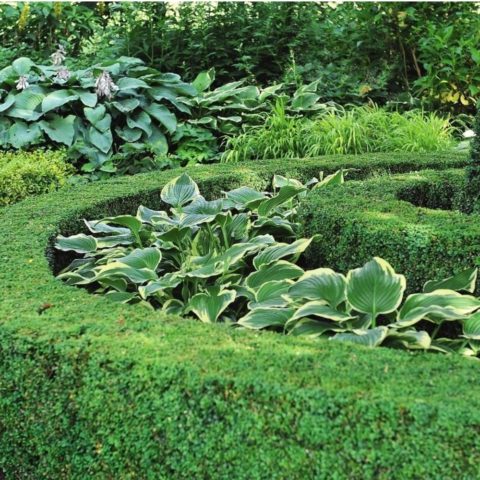
An original solution can be a "multi-layer" border
Breeding methods
You can get young seedlings of the Patriot hosts by seeds, cuttings and dividing the bush. With the first method, sowing should be carried out in June directly into the ground. The seed method makes it possible to obtain full-fledged patriot hosta bushes for the fifth year.
The second method involves propagation by leaf cuttings. To do this, use young shoots of hosts, tearing them off with the "heel". Rooting should be done in a moist substrate. The favorable period for "Patriot" cuttings is May-June.
The third method is the simplest and most affordable. It is recommended to divide the bush in the spring, when new shoots appear, or at the beginning of autumn. The mother plant should be divided into several parts, each of which should have a growth point and a well-developed root process. Therefore, the seedlings quickly take root in a new place and grow.
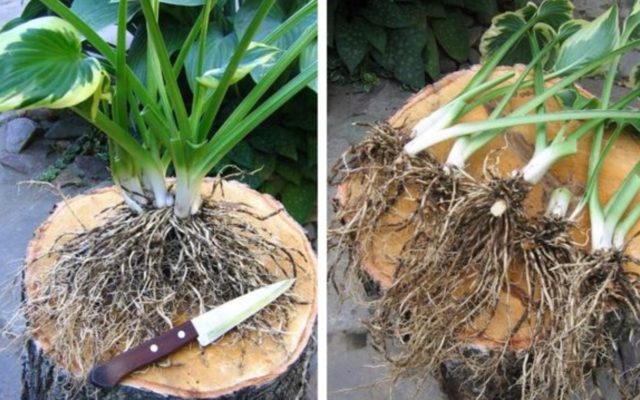
The division of the bush can be carried out once every 4 years.
Landing algorithm for Patriot hosts
This perennial is a long-liver and in one place it can grow for 20 or more years. It is recommended to grow the Patriot hosta in partial shade, since burns form on the leaves of the plant in direct sunlight, and the decorativeness of the plant is lost in conditions of deep shade. The optimal time for planting is the first half of May or late August and early September.
Khosta prefers to grow on loams with a low acidity level. It is also possible to grow in clay soil, but then lay a drainage layer 10 cm thick in the hole.
The site for planting should be dug up in 2 weeks. Then prepare planting pits 50 cm deep and wide. At the same time, fill each with a nutrient mixture of turf, humus, leafy earth and peat in a ratio of 2: 1: 1: 1. Plants must be placed at a distance of 70 cm from each other.
The seedling of the hosts "Patriot" should also be prepared before planting. To do this, it is necessary to inspect the roots and remove all damaged and rotten areas.
Landing Algorithm:
- A small mound must be made in the center of the pit.
- Place a seedling on it and spread the roots of the plant.
- Sprinkle them with earth so that the root collar is flush with the soil surface.
- Compact the earth at the base.
- Water abundantly.
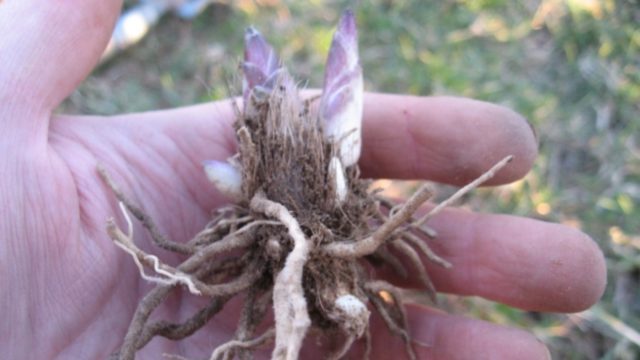
Sandy soil is not suitable for growing Patriot hosts
Growing rules
Hosta "Patriot" is an unpretentious perennial, but in order to obtain maximum decorative effect, some rules must be followed.
This hosta belongs to the category of moisture-loving crops. Therefore, she needs to ensure regular watering, in the absence of rain - 2 times a week. After each moistening, the soil should be loosened at the base so that air can freely penetrate to the roots. In hot periods, lay a 3 cm layer of mulch on the soil surface.
The seedlings should be fed from the third year, if humus was added to the soil during planting. In the spring, at the beginning of the growing season, the plant should be fertilized with organic matter twice at intervals of 2-3 weeks. Chicken droppings 1:15 or mullein 1:10 are suitable for this. In the absence, you can use mineral fertilizers with a high nitrogen content: urea, ammonium nitrate at the rate of 30 g per 1 bucket of water.
In June and July, wood ash with embedding in the substrate should be poured under the Patriot hosta bush. This will increase the variegation of the plant. If necessary, it can be replaced by adding superphosphate (40 g) and potassium sulfide (30 g) to a bucket of water.
Preparing for winter
Hosta "Fortune Patriot" does not need intensive preparation for the winter, but some activities still need to be carried out. It is necessary to start them after flowering. During this period, the peduncles at the base should be completely removed so that the plant does not expend energy on the formation of seeds.
In autumn, when the leaves of the hosta turn yellow, the aerial part should be pruned. It is also recommended during this period to mulch the soil at the base with humus or peat so that the root system does not freeze. From above you need to cover with spruce branches, brushwood or branches. This will help trap snow and protect the plant in severe frosts.
Diseases and pests
Hosta "Patriot" has a high natural immunity. But if the growing conditions do not match, it weakens significantly.
Possible problems:
- Phylostictosis. The disease manifests itself as rusty-brown spots on the leaves, which leads to a loss of decorative effect. In this case, it is recommended to remove the affected parts of the plant and treat the bush with the fungicide "Fitosporin-M", "Skor".
- Slugs. These pests feed on hosta leaves. Large holes in the leaf plates are a sign of their vital activity. To scare away slugs, it is necessary to pour broken shell, wood ash or sharp rubble at the base of the bush. In case of mass infestation, place trap containers filled with beer next to the plant.
Conclusion
Hosta Patriot is a hybrid form of culture that amazes with the beauty of its leaves. And the unpretentiousness of this perennial only contributes to the growth of its popularity among flower growers. With the help of "Patriot" you can make bright accents in the garden and add volume to even a small area. At the same time, the plant retains its decorative effect throughout the season, without requiring special care.
